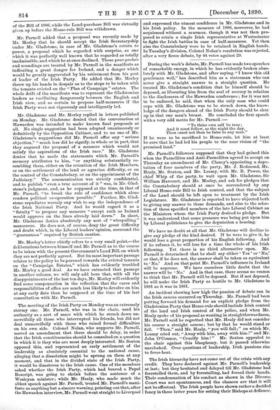Mr. Gladstone and Mr. Morley replied in letters published on
Monday. Mr. Gladstone denied that the conversation at Hawarden was intended to make known final proposals at all. No single suggestion had been adopted unanimously or definitively by the Opposition Cabinet, and to no one of Mr. Gladstone's suggestions did' Mr. Parnell offer any " serious objection," " much less did he signify, in whole or in part, that they augured the proposal of a measure which would not satisfy the aspirations of the Irish race." Mr. Gladstone denies that he made the statements which Mr. Parnell's memory attributes to him, "or anything substantially re- sembling them, either on the retention of the Irish Members, or on the settlement of the land or agrarian difficulty, or on the control of the Constabulary, or on the appointment of the Judiciary." The communication was strictly confidential, and to publish " even a true account of it " was, in Mr. Glad- stone's judgment, and, as he supposed at the time, in that of Mr. Parnell, "to break the rule of confidence which alone renders political co-operation possible." Further, Mr. Glad- stone repudiates warmly any wish to sap the independence of the Irish National Party. And he would regard it as a " fatuity " to propose any measure "except such as Ireland would approve on the lines already laid down." In short, Mr. Gladstone denies absolutely any sort of " wirepnlling " manoeuvre. He does not, of course, deny the great difficulty and doubt which, in the Liberal leaders' opinion, surround the " guarantees " required by British caution.






















































 Previous page
Previous page